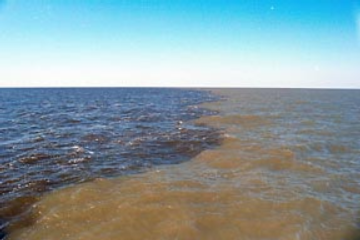Say Goodbye to the Sea

It appears that land-based rubbish, agricultural pollution and industrial muck are creating dead zones in costal waters, areas devoid of oxygen and thus life. On top of the preferred vaccum cleaner method of industrial fishing, we might as well say goodbye to the sea, despite what this industry lobby group would have us believe. Anyway, here's to the dead zones:
The number of ocean "dead zones" has grown from 150 in 2004 to about 200 today, said Nick Nuttall, a UNEP spokesperson.
"These are becoming more common in developing countries," Nuttall told IPS from Nairobi, Kenya.
Dead zones can encompass areas of ocean 100,000 square kms in size where little can live because there is no oxygen left in the water. Nitrogen pollution, mainly from farm fertilisers and sewage, produces blooms of algae that absorb all of the oxygen in the water.
Growing global populations, mainly concentrated along coastlines, and the resulting increase in untreated sewage are endangering human health and wildlife, as well as livelihoods from fisheries to tourism, according to the "State of the Marine Environment" report.
"An estimated 80 percent of marine pollution originates from the land," said Achim Steiner, United Nations undersecretary-general and UNEP's executive director.
"And this could rise significantly by 2050 if, as expected, coastal populations double in just over 40 years time and action to combat pollution is not accelerated," Steiner said in a statement...
In many developing countries, between 80 percent and nearly 90 percent of sewage entering the coastal zones is estimated to be raw and untreated. These wastes contain bacteria and viruses that can contaminate marine species such as shellfish that are consumed by people, Nuttall said.
Studies in the Caribbean Sea have also shown that sewage encourages the spread of disease in corals, ultimately destroying them. Around 80 percent of Caribbean coral has been lost to disease in the past 20 years, report researchers at the University of North Carolina in the United States.
Link
(thanks to Dale for the link and tag)
Labels: Say Goodbye to...




0 Comments:
Post a Comment
Subscribe to Post Comments [Atom]
<< Home